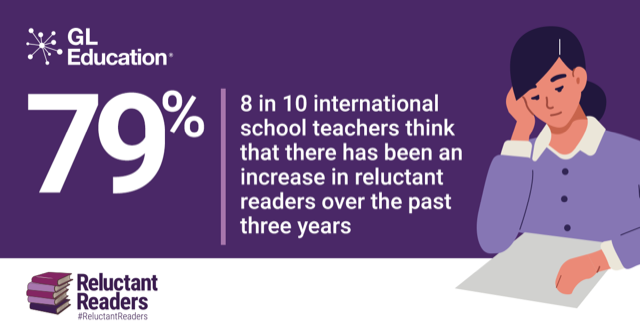Reading reluctance is a growing issue among MENA teens, say international schools
- Four in five teachers say their school has introduced additional reading time to help -
Four in five (83%) international teachers working in the Middle East have seen an increase in reading reluctance among their teenage students in the past three years, says a new report. The figure is 12% higher than in the UK, where 71% of teachers believe the issue is also on the rise.
The Reluctant Readers study, which involved 540 teachers across the UK and 350 international teachers in the Middle East, Europe and Africa, was carried out by assessment company, GL Education.
The 150 teachers in the Middle East that took part in the study say that the main culprit for reading reluctance is the increasing distraction of social media. Nine in ten (90%) of those surveyed believe that social media has a negative impact on children's reading habits, and 81% believe it negatively affects students' willingness to read for pleasure. Four in five (80%) believe students who cannot read at an expected level will be ill-equipped to access the curriculum.
Three quarters of teachers in the region also feel that they need more support in addressing the reading and literacy challenges faced by students. Three in five (59%) agree that they need more training in developing their students' reading and vocabulary skills, and 75% believe teachers need more training to specifically support English as an Additional Language (EAL) students' reading and literacy needs.
Amanda Clarke, International Director at GL Education, recognises the importance of reading proficiency, especially for EAL students. She said that: "Despite the fantastic strides made across the region when it comes to reading progress, no student seems immune to the lure of social media.
“If a student has limited proficiency in English, they will not be able to access the curriculum effectively. Yes, they might be able to read well enough to get by, but that doesn’t mean they are getting all that they can out of a lesson. Identifying these ‘invisible but struggling’ readers and introducing early intervention strategies can really help accelerate their progress.
“This is an issue that is clearly recognised by teachers at international schools across the Middle East, with 82% saying that supporting EAL students with reading and literacy is a strategic priority for their school.”
The GL Education study also found that most international schools across the region are now taking steps to improve all their students' reading abilities. Four in five (80%) have introduced additional reading time as a strategy this school year to help students with their comprehension skills (compared with 56% in the UK). And 64% of schools have introduced reading aloud sessions (versus 39% in the UK). The vast majority (83%) also say their school is using reading assessment data to better understand and address barriers to learning.
Yet despite these efforts, some students still see reading as a chore. A quarter (23%) of teachers agree that male students view being asked to read as a punishment (compared with 33% in the UK). Only 26% (versus 17% in the UK) agree that male students see it as something that is fun.
The same is true, but to a lesser extent, for female students. Teachers think 12% (compared with 15% in the UK) view reading as a punishment and 41% (24% in the UK) see it as fun.
Interestingly, half (49%) of teachers surveyed believe that too much importance is placed on students reading actual books, as opposed to newspapers, online content, and magazines.
Amanda Clarke added that: “Reading is a vital skill as, without it, students won’t be able to access the curriculum and succeed. The study highlights that teachers recognise that reading reluctance is a growing problem and demonstrates the importance of having access to data that can quickly flag those students whose progress is being affected.”
Teachers can find out more on GL Education’s dedicated website – ‘Reluctant Readers’ – from today (8 March 2023) at gl-education.com/reluctant-readers
GL Education has scheduled workshops in Dubai during March to support teachers in using data from the New Group Reading Test (NGRT) and the Cognitive Abilities Test (CAT4) to identify literacy needs at student and cohort level. Find out more at gl-education/events.
- Ends -
For more information and to request a copy of the research, contact:
Mark Cooper
Gerard Kelly & Partners
+44 (0)203 763 2703 / +44(0)7879 407 283

